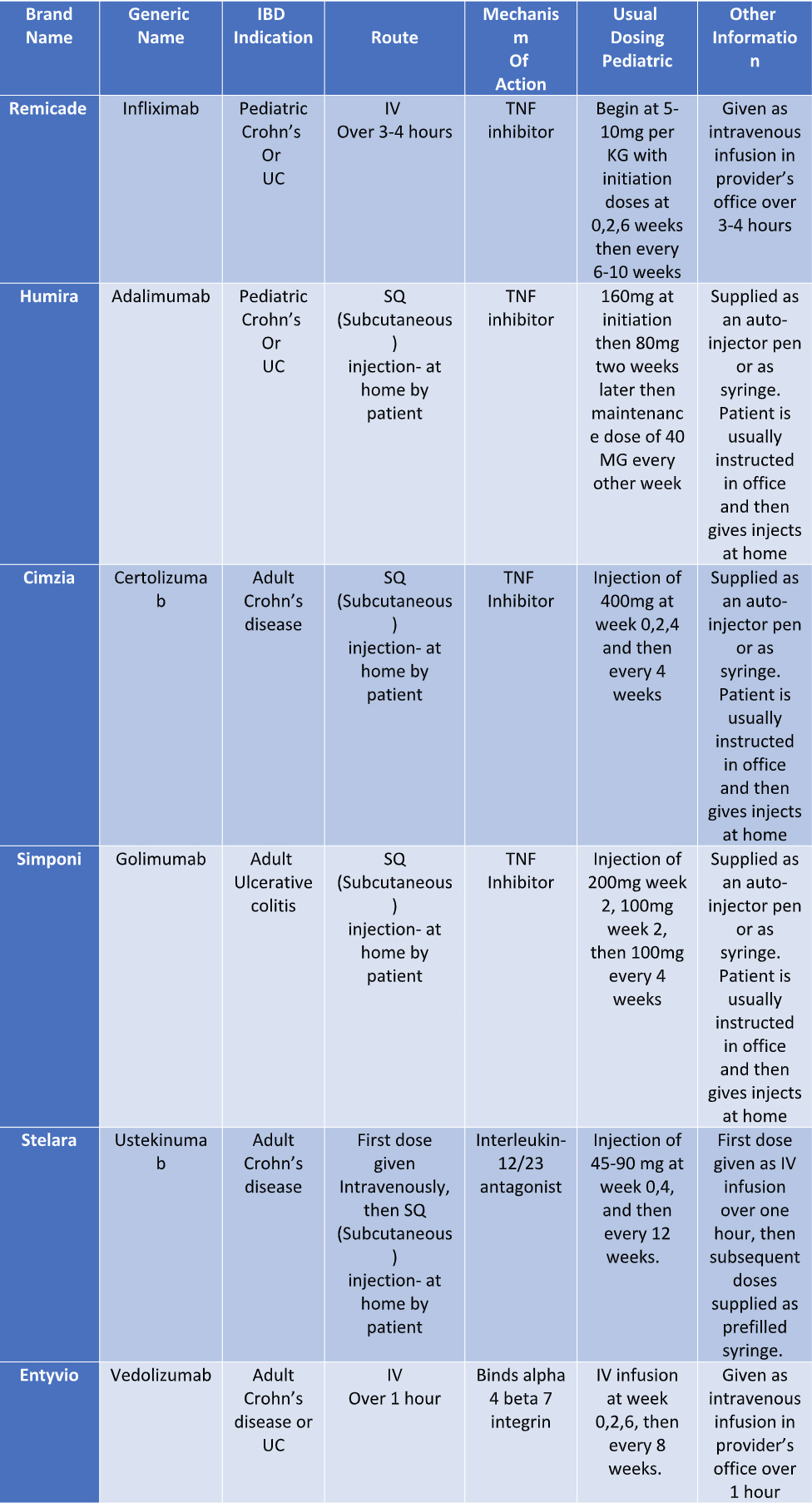What are Biologic Agents?
Biologic agents are complex proteins created through biological processes in living cells. They are created through:

 In terms of complexity, comparing the two would be like saying that antibiotics are a tent, whereas biologics are the Empire State Building. Drugs like NSAIDs (e.g., ibuprofen) and antibiotics (e.g., amoxicillin) are created in a lab by combining two or more chemicals, a relatively simple and specific process. Biologics, on the other hand, have a complex production process that gives small quantities, and they are made by living cells. They work specifically on your immune system to target proteins that cause inflammation.
Route of Administration
Because biologics are proteins, they are extremely sensitive to enzymatic action (e.g., pancreatic enzymes) and physical conditions (e.g. temperature, light) and therefore cannot be taken orally. They must be given via injection or infusion.
Side Effects
Rare but serious side effects of biologic agents include:
In terms of complexity, comparing the two would be like saying that antibiotics are a tent, whereas biologics are the Empire State Building. Drugs like NSAIDs (e.g., ibuprofen) and antibiotics (e.g., amoxicillin) are created in a lab by combining two or more chemicals, a relatively simple and specific process. Biologics, on the other hand, have a complex production process that gives small quantities, and they are made by living cells. They work specifically on your immune system to target proteins that cause inflammation.
Route of Administration
Because biologics are proteins, they are extremely sensitive to enzymatic action (e.g., pancreatic enzymes) and physical conditions (e.g. temperature, light) and therefore cannot be taken orally. They must be given via injection or infusion.
Side Effects
Rare but serious side effects of biologic agents include:
- Inserting a piece of DNA that codes information into a living cell (e.g. bacterial or viral cell).
- This DNA instructs the cell to produce a large amount of protein.
- The protein is purified and the processed molecules become the active ingredient in the drug.

 In terms of complexity, comparing the two would be like saying that antibiotics are a tent, whereas biologics are the Empire State Building. Drugs like NSAIDs (e.g., ibuprofen) and antibiotics (e.g., amoxicillin) are created in a lab by combining two or more chemicals, a relatively simple and specific process. Biologics, on the other hand, have a complex production process that gives small quantities, and they are made by living cells. They work specifically on your immune system to target proteins that cause inflammation.
Route of Administration
Because biologics are proteins, they are extremely sensitive to enzymatic action (e.g., pancreatic enzymes) and physical conditions (e.g. temperature, light) and therefore cannot be taken orally. They must be given via injection or infusion.
Side Effects
Rare but serious side effects of biologic agents include:
In terms of complexity, comparing the two would be like saying that antibiotics are a tent, whereas biologics are the Empire State Building. Drugs like NSAIDs (e.g., ibuprofen) and antibiotics (e.g., amoxicillin) are created in a lab by combining two or more chemicals, a relatively simple and specific process. Biologics, on the other hand, have a complex production process that gives small quantities, and they are made by living cells. They work specifically on your immune system to target proteins that cause inflammation.
Route of Administration
Because biologics are proteins, they are extremely sensitive to enzymatic action (e.g., pancreatic enzymes) and physical conditions (e.g. temperature, light) and therefore cannot be taken orally. They must be given via injection or infusion.
Side Effects
Rare but serious side effects of biologic agents include:
- Infusion reactions – chest tightness, shortness of breath, rash, vomiting, fever, and arthritis that can occur either acutely or within 14 days
- Serious infections – increased susceptibility to bacterial, fungal, and viral infections
- Patients should undergo screening for tuberculosis, as well as measure titers for vaccine-preventable illnesses before starting treatment.
- Malignancy – mildly increased risk of lymphoma and hepatosplenic T cell lymphoma
- Humira (Adalimumab) – TNF inhibitor for Crohn’s or UC
- Remicade (Infliximab) – TNF inhibitor for Crohn’s or UC
- Cimzia (Certolizumab) – TNF inhibitor for Crohn’s
- Stelara (Ustekinumab) – Interleukin 12/23 antagonist for Crohn’s
- Entyvio (Vedolizumab) – Binds alpha 4 beta 7 integrin for Crohn’s or UC
Biological Agents Used in Treatment of Inflammatory Bowel Disease















